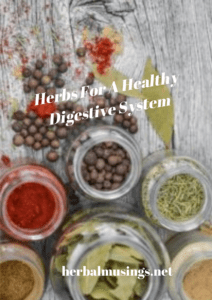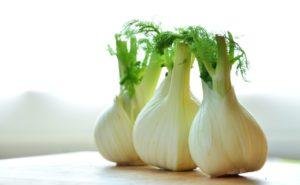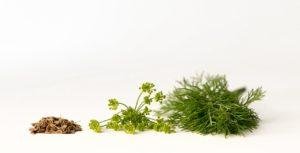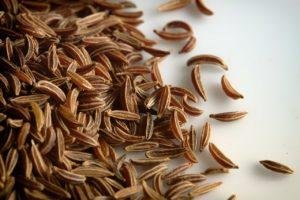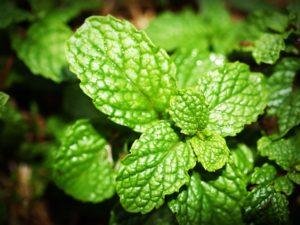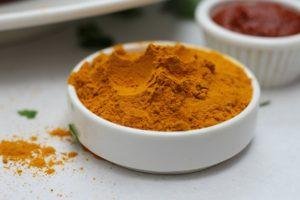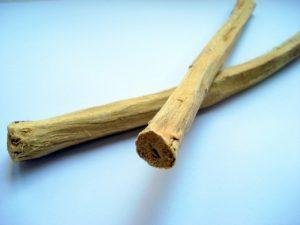A healthy digestive system supports our mental and emotional well being, while also processing nutrients and delivering them through the entire body. Your digestive health is so important. Your elimination system carries away the wastes of all of your cells, allowing each organ to function in a proper environment. But elimination troubles can put your daily routine out of whack. Simple digestive herbs can put you back in balance.
Carminative Herbs
Carminative herbs help to reduce and prevent the formation of gas in the digestive tract and relieve bloating. Most carminative herbs are also antispasmodics that help relieve digestive cramps.
Fennel (Foeniculum vulgare) reduces cramping, gas and bloating and it stimulates a dull appetite. Fennel seeds give us energy by enhancing appetite, digestion, and absorption. It helps your body break down and digest fatty foods. Throw some ground fennel seeds into a hot tea after a meal to relieve digestive discomfort.
Cardamom (Elettaria cardamomum) relieves bloating, cramping, nausea, indigestion, and gas. Cardamom stimulates your appetite helping food to pass easily through your system. It contains chemicals that increase the movement of food through the intestine and stimulates the secretion of bile acid in the stomach.
Dill (Anethum graveolens) stimulates digestion and the secretion of bile and digestive juices to break down your food into nutrients. The oils in dill also stimulate the intestine, easing the passage of bowel movements and relieving constipation. Dill helps prevent excessive gas and helps calm and relieve intestinal gas.
Cumin (Cuminum cyminum) helps digestion and is great for heartburn. Cumin aids digestion by increasing the activity of digestive proteins. The ground seeds reduce symptoms of irritable bowel syndrome and relieve diarrhea, bowel spasms, gas and stomach aches.
Caraway (Carum carvi) has antimicrobial properties that support the development of beneficial intestinal bacteria. The seeds are used for digestive problems including heartburn, bloating, gas, loss of appetite, and mild spasms of the stomach and intestines.
Lemon balm (Melissa officinalis) relieves stagnant digestion, eases abdominal cramping and promotes the overall digestive process. For digestive relief, lemon balm is best consumed as a tea taken immediately after meals.
Coriander (Coriandrum sativum) helps relieve gas and settle indigestion. It calms intestinal spasms that lead to diarrhea. The seeds are used for nervous dyspepsia, colic, flatulence, irritable bowel disease, and gastritis.
Thyme (Thymus vulgaris) calms an upset stomach, nausea, constipation, bloating or cramping. Its anti-inflammatory properties and antibacterial effects can help get rid of stomach bugs and promote proper digestion, while also normalizing bowel movements.
Herbs for Digestion
Peppermint (Mentha piperita) works by settling the stomach and helps with digestion and stimulating the appetite. Peppermint is an antispasmodic, relieving pain and spasms in stomachaches, colic, indigestion, constipation, and IBS. It eases gassiness and bloating and enhances appetite and digestion.
Turmeric root (Curcuma longa) supports digestion by relaxing the smooth muscles in the stomach and gently pushing food through the intestines. It also helps to prevent gas and bloating as food is being digested. It inhibits the enzymes that compromise stomach health and boosts the secretion of stomach mucous. This mucus is the primary defense against damage from gastric acid.
Ginger (Zingiber officinale) sip ginger tea for its tummy soothing abilities and its anti-inflammatory properties. It’s a warming digestive stimulant that helps to improve both digestion and appetite. It helps to relieve indigestion, gas, nausea, IBS and food allergies.
Dandelion (Taraxacum officinalis) is a powerful bitter that catalyzes the production of intestinal enzymes while stimulating the production of bile. Dandelion helps our body break down and assimilate essential vitamins and nutrients and also filters waste from the bloodstream and supports the liver in releasing toxins.
Chamomile (Matricaria recutita) is calming to the intestines and stomach and acts as a soothing anti-spasmodic. Use to soothe a nervous stomach, treat IBS, colic, gas, diarrhea, cramps, and indigestion. Drinking a cup of chamomile tea after a meal helps relieve distress.
Herbs For Relieving Constipation
Certain teas may help relieve constipation because they have natural laxative properties. Regularly consuming fluids such as tea is one of the best ways to prevent constipation or treat it when symptoms develop.
Senna leaf (Senna alexandrina) is effective in relieving constipation it softens stool by enabling the colon to absorb water. It can effectively cure even the most severe cases of constipation.
Cascara sagrada (Rhamnus purshiana) acts as a stimulant laxative, helping intestinal muscles to contract and move particularly stubborn stool through the bowels to keep you regular and healthy.
Aloe leaf (Aloe vera) juice taken before a meal helps the digestive system work better to break down the food. It also prevents problems such as gas, bloating and constipation. This plant helps heal the lining of a damaged intestinal tract, healing or preventing leaky gut syndrome. Aloe is a laxative-acting food that increases intestinal water content, stimulates mucus secretion and contains enzymes that help the body break down food.
Demulcent Herbs
Licorice root (Glycyrrhiza glabra) is a cooling tonic and is a soothing demulcent to protect mucous membranes of the GI tract. The root releases secretions that protect the gut lining against stomach acid and other digestive juices that can cause discomfort. Licorice has anti-spasmodic and anti-inflammatory properties that allow it to have both a gentle laxative effect while also being antidiarrheal.
Slippery Elm (Ulmus rubra) heals sensitive or inflamed mucous membranes of the gastrointestinal tract. Slippery elm is soothing to the entire digestive tract because it forms a soothing film over any mucous membrane it comes into contact with. It softens and adds bulk to stools, so it is useful for diarrhea and constipation issues.
Focus on whole, fresh foods and eat fermented and cultured foods. Fermented foods are high in good bacteria and eating them will help you to regenerate your gut flora naturally. Doing this along with the herbs listed above will help your digestive system heal.
This post may contain affiliate/referral links. Read my full Disclosure/Disclaimer Policy.
